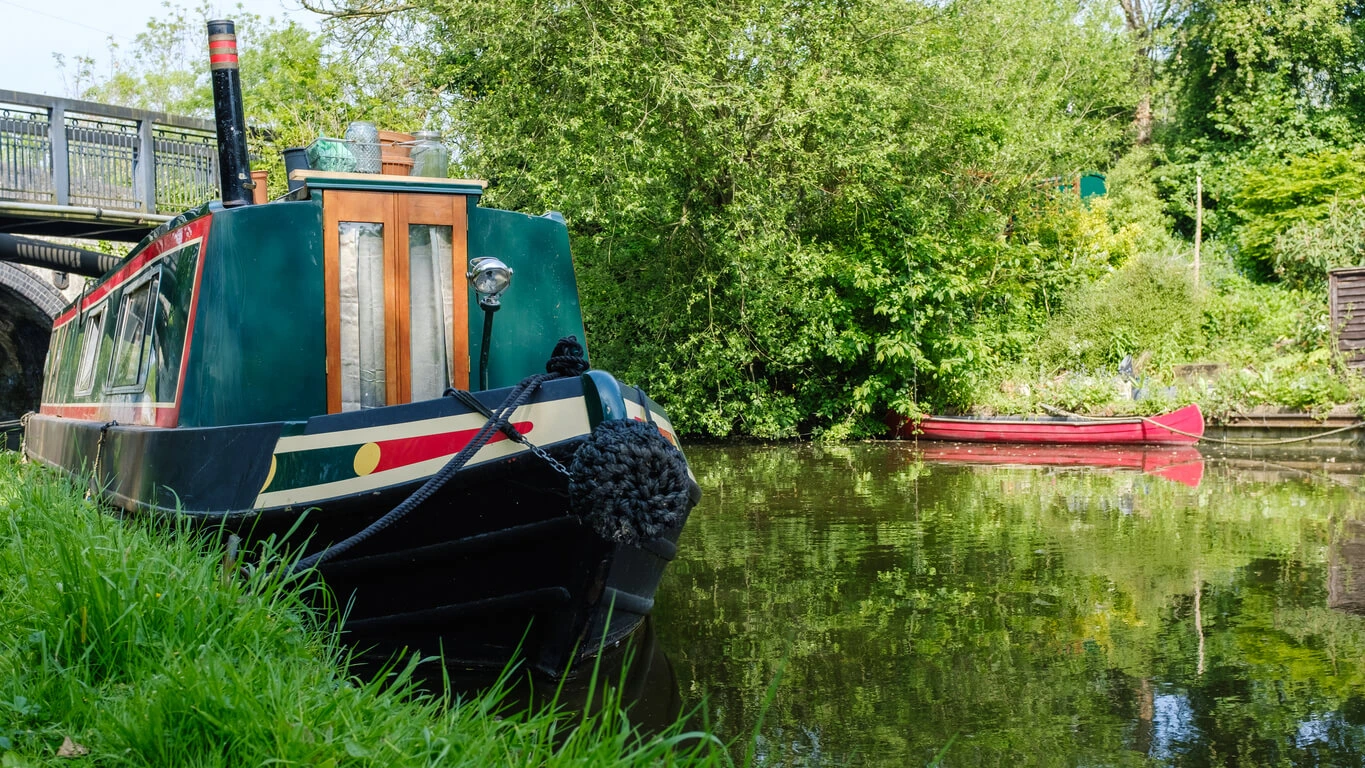Mooring a narrowboat: Your essential guide
30 September 2025

Whether you’re stopping for a short break or a long-term stay, mooring a narrowboat can be challenging if you have little or no experience.
Here, we discuss the most common narrowboat mooring types and detail 10 tips for mooring your narrowboat. We’ll also look at some mooring safety tips and how much it costs to moor a narrowboat.
Types of narrowboat moorings
There are many different types of narrowboat moorings, and the right one for you depends on your duration requirements, preferred location, and budget. The main types of narrowboat moorings are:
Long-term moorings
A fixed location mooring with a long-term agreement that typically falls between three months and three years. Long-term moorings can be provided by the Canal & River Trust, private marinas, or landowners and can be used for either residential or leisure purposes depending on your licence and permissions.
Short-term moorings
Short-term moorings are typically limited to between 24 hours and 14 days and are ideal for passing traffic, cruising holidays, and temporary stays. This type of mooring is often free, especially Canal & River Trust 48-hour or 7-day moorings, but some high-end locations may charge. You’re most likely to find short-stay moorings near popular towns and villages with good amenities.
Continuous cruising
Continuous cruising refers to when you have no fixed mooring and you continuously move your boat. To fall into this narrowboat mooring category, you must ensure you make a genuine progressive journey and move every 14 days. You’ll need a Continuous Cruiser License from the Canal & River Trust and won’t need to pay mooring fees. If you’d like to moor up over the winter months between November and March, you can find temporary winter moorings which are offered by the Canal & River Trust and some private marinas.
Online and offline moorings
Online narrowboat moorings are when you moor along the canal or riverbank and offline mooring refers to mooring in marinas, basins, or connected basins off the main waterway. Offline moorings are often more secure and have more facilities while online moorings may be more exposed but cheaper.
Towpath and offside moorings
Towpath moorings are those on the side of the canal with the public path. These are usually open to everyone although they’re often subject to time limits. Offside moorings are those located opposite the towpath. These are typically private and require permission or rent.
How to moor a narrowboat
Mooring a narrowboat can be daunting the first time you attempt it, but you’ll find it becomes second nature over time.
These 10 tips will help you to successfully moor your narrowboat:
- give yourself plenty of time to reduce your speed before you reach your mooring spot
- glide your narrowboat in slowly and use reverse gear to control the final approach
- approach at a shallow angle of around 30°, especially if there is a strong wind or current
- be aware of any boat traffic or obstructions nearby
- bring your narrowboat parallel to the bank with the bow slightly angled in
- use gentle tiller movements to align your boat and go into neutral or reverse as needed
- don’t scrape the hull along the bank
- if needed, use a boat hook to fend off gently, never use your hands or feet for this
- tie the front of your narrowboat to a ring, bollard, or mooring pin and do the same at the back
- if you use the centre line, only use it temporarily while mooring and don’t rely on it for permanent mooring
Safety checks when mooring your narrowboat
- ensure ropes are not causing a trip hazard on the towpath
- avoid blocking access paths, lock landings, or services
- always double-check knots before leaving your narrowboat unattended
How much does it cost to moor a narrowboat?
The cost of mooring a narrowboat in the UK varies significantly depending on location, boat size, facilities, if it's residential or leisure use, and whether you choose to moor in a marina, on a towpath, or at a private mooring.
Some of the main factors that impact the cost include:
- Location: moorings near big cities and popular cruising areas are more expensive while remote canals are cheaper
- Boat size: the longer or wider your narrowboat, the more it will cost to moor
- Facilities & services: mooring options with good facilities, such as electricity, water, toilets, showers, Wi-Fi, and security, will typically come with a higher fee than more basic moorings
- Type of mooring: residential narrowboat moorings usually cost more than leisure or non-residential moorings
- Authority and ownership: prices differ depending on who the mooring belongs to, for example the Canal & River Trust, Environment Agency, or a private landowner
- Licences, utility charges & extras: mooring can be a separate cost to the licence required to use the waterways and some utilities or waste pump‑outs might come at an additional cost too
Average narrowboat mooring costs
With so many factors to consider, working out an average narrowboat mooring cost can be challenging. As a rough guideline, if you own a narrowboat that’s around 40-60ft in length and moor this for a year, you can expect to pay approximately:
- £1,000 – £2,500 for a basic private or rural leisure mooring with minimal facilities
- £2,500 – £5,000 for marina mooring with good facilities, including electricity, water, and showers, in a remote area
- £4,000 – £10,000+ for residential mooring at a good marina in a desirable location. For example, close to a city or at a popular scenic spot
- £10,000 for premium mooring in a major city, like London, or a high-end marina
Specialist boat insurance through GJW Direct
Now you know how to moor a narrowboat and how much it costs, you may want to consider specialist narrowboat insurance, so you know your vessel is financially protected wherever you decide to moor.
Get your quick online quote today.
Please note the information provided on this page should not be taken as advice and has been written as a matter of opinion. For more on insurance cover and policy wording, see our homepage.
Got a question? Call our UK call centre 0151 473 8000
©Copyright Ripe Thinking Limited 2026. GJWDirect® is a registered trademark and a trading name of Ripe Insurance Services Limited which is Authorised and Regulated by the Financial Conduct Authority No.313411.
Registered office: One Stockport Exchange, Railway Road, Stockport, United Kingdom, SK1 3SW. Registered in England No. 04507332.
